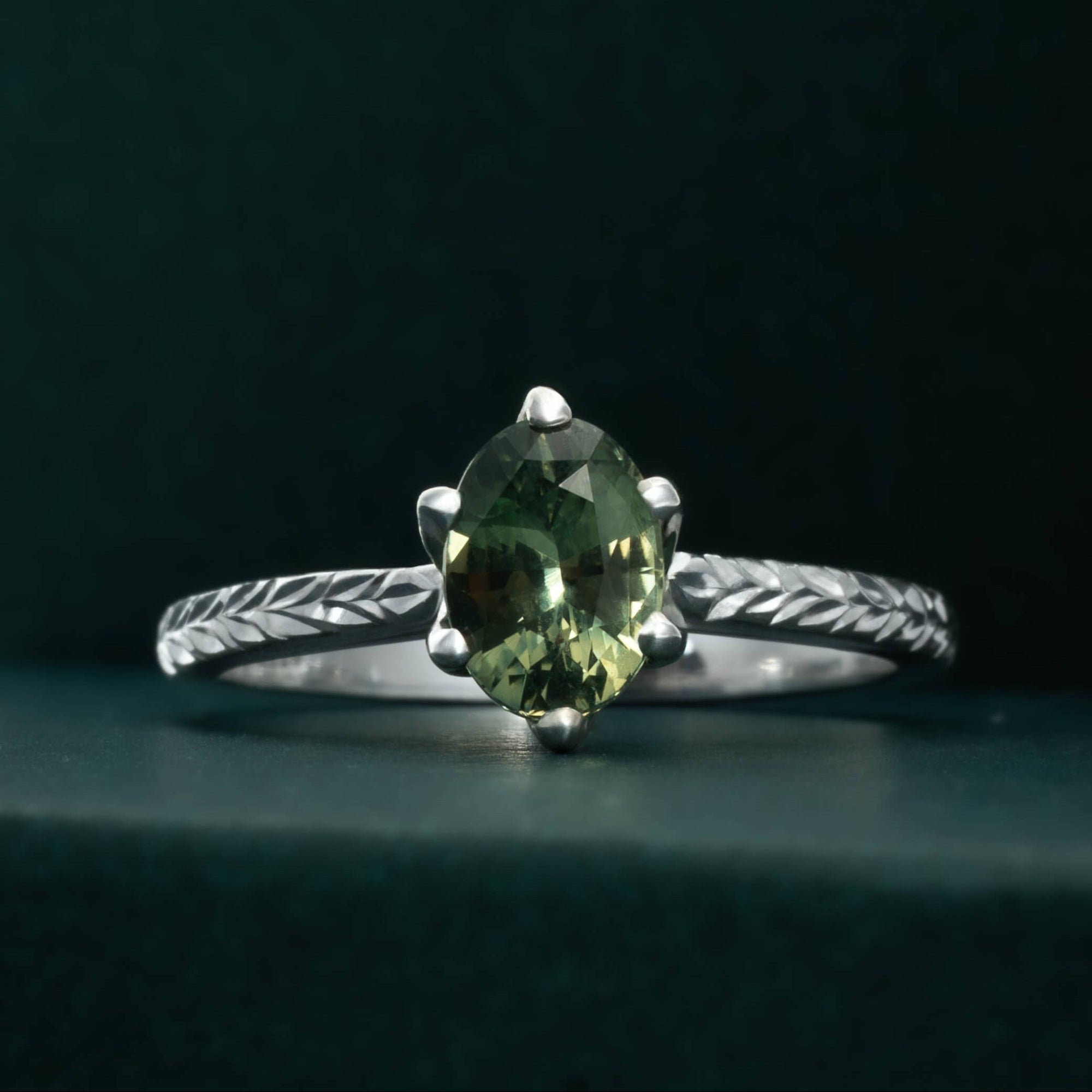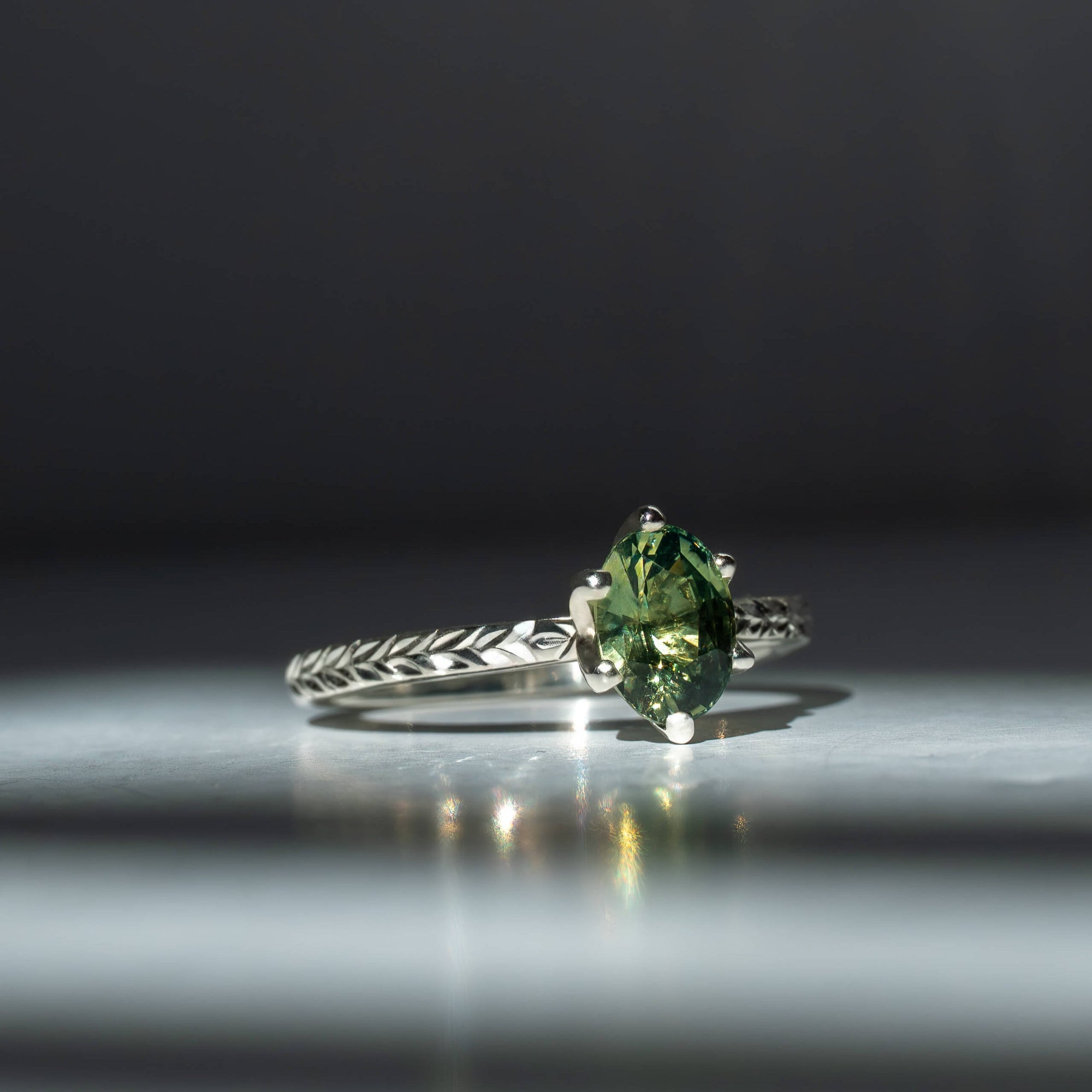Curved (Contour) Wedding Bands: A Liverpool Jeweller’s Guide to the Perfect Fit
Some rings simply don’t want a straight-line companion. Low-set solitaires, unique cluster settings, east–west ovals, vintage bezels, halos with soft corners, marquise or kite shapes, even sculpted shoulders, these are the pieces that shine brightest with a curved (contour) wedding band designed to follow their lead. If your engagement ring leaves a little gap with a traditional band, this guide is for you.
I’ll explain how contour bands work, what to measure at home, the main shapes (soft arc, chevron, crown, shadow bands), and how I tailor my Aries fitted band plus any custom contour to nest beautifully with your ring.
What is a curved/contour wedding band and when do you need one?
A curved (also called contour, chevron, nesting, or shadow) wedding band has a gentle dip or shaped notch that lets it sit closer to your engagement ring. You’ll benefit from a contour band if your ring has any of the following:
-
Low-profile settings (stone sits close to the finger)
-
Protruding features (pear/marquise tips, compass prongs, claws that overhang)
-
Bezel or halo edges that a straight band can’t tuck under
-
Cluster/three-stone designs with lower side stones
-
Sculpted/cathedral shoulders that flow outwards
-
East–west or elongated shapes where a straight band looks “gappy”
A well-shaped contour keeps the look flush, comfortable, and intentional with no awkward daylight between bands.
How to measure at home (so I can advise the perfect curve)
You only need a phone camera and a ruler. Send me two photos and the notes below:
-
Side profile photo
-
Measure from the top of your engagement ring’s band to the lowest point of the setting/stone.
-
This “height” tells me how deep the curve needs to be.
-
-
Front/top photo
-
Note any features that project beyond the band (tips, prongs, halo, bezel lip).
-
Tell me where the gap appears and how big it looks (a quick ruler in-frame helps).
-
-
Your preferences
-
Do you like a soft arc, a gentle V (chevron), a crown curve with a tiny point, or a shadow band with a shaped notch?
-
Will you want two mirrored bands to “crown” the engagement ring later?
-
Pop those into an email and I’ll advise curve I recommend. If you decide to become a Moments customer I'll send you a moulding kit to take an impression of your engagement ring at home. I can then make a model of your ring profile in my studio and use this to fit your paired band (please contact me to request a kit).
Contour styles (and how they behave)
-
Soft Arc
A shallow dip that hugs the belly of the setting. Minimal and graceful. Best when the ring sits fairly low. -
Chevron (V-Shape)
A gentle point that meets the feature head-on (great for projections or tips). Elegant and slimming on the finger. -
Crown Curve
Between arc and chevron: a soft apex that frames the centre without stealing attention. Romantic and versatile. -
Shadow Band / Notch
A more precise negative space carved to your ring’s outline. Brilliant for bezels, halos, square or rectangular stones, or sculptural clusters.
Low vs high profile: why it matters
-
Low-profile rings need deeper curves so the band can tuck under the setting without touching it.
-
Higher-profile rings can work with shallower arcs (sometimes almost straight) because the band passes beneath the feature.
Either way, I shape the contour to avoid contact with delicate points and prongs, comfort and longevity first.
Diamonds or plain? Botanical or celestial?
Your contour can whisper or sing:
-
Plain polished contour — timeless, lets your engagement ring lead.
-
Diamond-set taper — gentle sparkle that echoes a curve or centre shape.
-
Botanical engraving — hand-engraved laurel/leaf motifs for a nature-led pair.
-
Celestial detailing — star-set stones or a soft constellation scatter if you love night-sky glimmer.
Timeline & budget (Liverpool, UK)
-
Consultation: email or quick call; bring photos.
-
Design confirmation: I’ll share notes/sketches of your curve.
-
Making: handmade to order in my Liverpool studio; currently around 12–15 weeks because each contour is individually adjusted for a true fit.
-
Price: varies with metal, contour depth, and diamonds/engraving. I’ll quote clearly before we begin.
How to start
-
Considering the Aries ring? Explore the engagement ring and fitted band made to pair with it here.
-
Already have a ring that needs a contour? Send two quick photos and I’ll advise the shape and depth: info@momentsjewellery.com
-
Want a signature touch? Ask about laurel engraving (botanical) or star-set accents (celestial).
Quick FAQs
Will a contour band rub my setting?
No. I shape the curve to clear tips, prongs, and halo edges so they're close visually, but safe physically.
Can I add diamonds or engraving later?
Often yes. Plain contours can be engraved or star-set afterwards; I’ll check thickness first.
Can I stack two contours?
Absolutely. I’ll mirror angles and thickness so your crowned stack looks intentional.
What if my engagement ring isn’t from you?
That’s fine, I regularly shape contours to rings from other jewellers. Photos + measurements are all I need.
Ready to find your perfect contour?
Whether you’re local to Liverpool or elsewhere in the UK, I’d love to craft a wedding band that feels made for your ring...because it will be. Send me your photos and a few notes, and I’ll guide you to a shape that sits just right.



